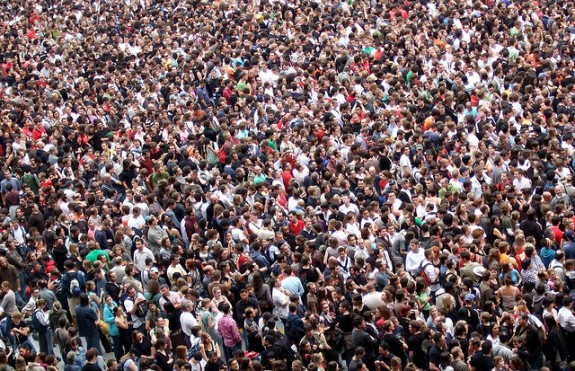The World Is Heading for 11 Billion People This Century
How are we going to feed them all?

Photo: James Cridland
One of the biggest concerns for the leaders of the world is figuring out how to feed all of us as the global population swells. Everything from eating bugs to restructuring the global agricultural system has been pitched as a solution to our food woes. And now an updated forecast of the future size of humanity is going to make this enterprise even trickier.
According to earlier projections by the United Nations, we were looking at feeding just under 9 billion people. Then, two years ago, this estimate was revised up, to 10 billion by 2100. Now we’re looking at closer to 11 billion people by the end of the century.
What’s 2 billion people? It’s about 2.7 Europes. Or 6.4 Americas.
The shifting population projections stem, says Robert Engelman for Yale’s Environment 360, from a higher-than-expected birth rate for many countries around the world:
hat the new projections say especially loudly, based in large part on the 2010 round of country censuses, is that women in many of the world’s poorest and most conflict-prone countries are having significantly more children than previously thought, largely because many governments are no longer making family planning a high priority.”
… What the new fertility estimates reflect is not just counting errors but a collective failure to provide women around the world with something they need that men don’t have to ask for: safe and effective ways to avoid pregnancies they don’t intend or want, along with the education and autonomy to put their childbearing decisions into effect.
All of these people, says Vice, are going to stress the productive capacity of the planet, in terms of raw resources and food production:
According to the Global Footprint Network, humans are using the equivalent of 1.5 Earths to provide resources and absorb our waste products—meaning that it would take 18 months for the planet to regenerate all that we consumed in the previous year. Under a moderate business-as-usual scenario that rises to nearly 3 planets by mid-century. By using up resources faster than they can be regenerated, we are destroying the ability of the planet to support life.
…If we are to hold the notion of relative equity between all humans to be a laudable goal, then with 9.6 billion people on the planet, individual resource consumption in currently wealthy nations must fall to accommodate growth elsewhere. It’s either that, or we must abandon notions of aspirational equity among nations, or worse, prepare ourselves for some serious, potentially violent, competition over basic resources.
More from Smithsonian.com:
A Four-Point Plan For Feeding Nine Billion People
As Global Food Prices Climb, So Does the Probability of Riots
Why the Population Time Bomb Hasn’t Finished Exploding
/https://tf-cmsv2-smithsonianmag-media.s3.amazonaws.com/accounts/headshot/smartnews-colin-schultz-240.jpg)
/https://tf-cmsv2-smithsonianmag-media.s3.amazonaws.com/accounts/headshot/smartnews-colin-schultz-240.jpg)